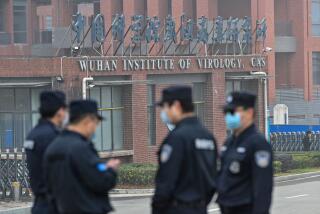Drill Reportedly Shows Germ Attack Vulnerability
- Share via
NEW YORK — Despite an enormous federal effort to prepare for a biological terrorist attack, a mock germ warfare assault last month showed that the United States is unprepared to deal with such a crisis, a published report said today.
The secret drill simulated a smallpox hybrid virus that was dropped along the U.S.-Mexico border, the New York Times said. Officials who participated in the drill soon found themselves arguing as they were overwhelmed by a panicked population, short of the right antibiotics and vaccines, hampered by antiquated quarantine laws and unable to get trained, immunized medical staff to the area, the report said.
Officials said the drill was part of a continuing effort by President Clinton to increase the U.S. readiness to deal with a terrorist attack.
The newspaper said that Clinton has developed a great personal interest in the possibility of a biological attack and even had his staff investigate the credibility of “The Cobra Event,” a book about a fictional terrorist attack on New York City that particularly alarmed him.
On April 10, just after working through most of the night on the Irish peace accord, Clinton met with a panel of experts he had convened to brief him on biological weapons. He also asked them to prepare a report suggesting ways the government could be better prepared to detect and deter a biological attack, the newspaper story said.
A report on the test, expected to be submitted this week, suggests stockpiling antidotes, vaccines and antibiotics and setting up mechanisms to make large quantities in a hurry, the newspaper said. The experts also recommended strengthening the public health sector and streamlining the government processes for detecting and managing a biological crisis.
Experts widely disagreed on the likelihood of such an attack, the paper said.
This week Clinton is expected to sign two new directives that provide a sweeping plan for dealing with chemical, biological or computer-related weapons, the story said.
More to Read
Sign up for Essential California
The most important California stories and recommendations in your inbox every morning.
You may occasionally receive promotional content from the Los Angeles Times.










